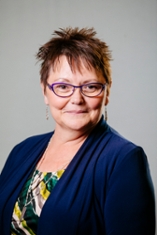
Jeanie Wills PhD
DK Seaman Chair in Technical and Professional Communication & Associate Professor Ron and Jane Graham School of Professional DevelopmentMy position, as an interdisciplinary humanities scholar teaching in the Graham School of Professional Development in the College of Engineering, has provided me the opportunity to unite my scholarship and teaching to consider the needs of minority populations in our community, such as women and Aboriginal people. I seek to connect my research and my teaching in meaningful ways to primarily engineering students. The material I teach in these classes has been shaped by my research agenda.
- Address
- Room 2A20.7, Engineering Building
- 57 Campus Drive
- Saskatoon, SK
- S7N 5A9
Education and Experience
Ph.D. University of Saskatchewan, 2011. Interdisciplinary Studies
M.A. University of Saskatchewan, 2000. English Department
B.A. High Honours University of Saskatchewan, 1996. English Department
The study of rhetoric is the study of human relations as they are evident in all of our communication activities. Developing interpersonal relationships, asserting personal identity, establishing professional credibility, creating and organizing groups to achieve cooperation, building and maintaining community, and negotiating to achieve collaborative decision-making all fall within the scope of rhetoric. Rhetorical theory and critical methodologies can be used across disciplines better understand how communication functions to help humans weave (or unravel) the social fabric. My research agenda is interdisciplinary in nature and broadly concerned with examining the rhetorical strategies used establish identity, cultural, professional, and personal.
As an interdisciplinary scholar with a focus on rhetorical theory and practice, I strive to incorporate methodologies from history and feminist studies, as well as rhetorical studies. To this end, I have steadily increased my knowledge of interdisciplinary practices as well as worked to increase my knowledge in the field of rhetorical scholarship. My scholarly growth has achieved both depth and breadth through my involvement with various academic societies. I currently hold membership in three societies:
- FEMRHET (Coalition of Feminist Scholars in the History of Rhetoric and Composition)
- CHARM (Conference on Historical Analysis in Research and Marketing)
- CSSR (Canadian Society for the Study of Rhetoric)
Building on my expertise in rhetorical criticism and theory and the history of advertising
professionals, I have developed a research agenda based on historical research about women who
worked in advertising between 1900 and 1939. My research agenda enables me to contribute academically to the disciplines of rhetoric, history, and feminist studies and to further the mission of the University of Saskatchewan and the College of Engineering. I am conducting research that explores the ways that members of marginalized populations working in male dominated areas of specialization craft professional identity, build credibility, and establish themselves as effective citizen their disciplines
Publications
* John Moffatt 40%, Corey Owen 25%, Deb Rolfes 20%, Jeanie Wills 15%. The percentages attributed to each of the authors reflect the approximate number of words that each contributed to the text, based generally on the individual sections that each one wrote. Final editing for continuity would not substantially change the proportions of text ascribed. That being said, this paper was a genuinely collaborative effort, since the group as a whole was actively engaged throughout the process. Consequently, any individual member’s contributions were more substantial than a word-count can indicate, and determining where one person’s efforts end and those of another begin is difficult. The total process required different individuals to assume or share leadership at various moments: identifying, selecting, and circulating the primary texts for analysis; initiating group discussions at each stage from the formulation of the original proposal to final editing; facilitating collective decisions on methodology and theoretical frameworks; guiding email consultations during writing and editing. Ultimately, no one’s role could be described as minor.
Alberta Oil Sands,” Petrochemical Rhetoric: Living in the Age of Oil in the 21st Century. Eds. H. Graves and D. Beard. (13,537 words).
Wills, J. 2017. (Accepted Forthcoming Sept 2017). “A Woman’s Place: Career Success and Early 20th Century Women’s Advertising Clubs.” Feminists, Feminisms, and Advertising: Some Restrictions Apply. Eds. K. Golumbisky and Peggy Kreshel. Lanham: Lexington/Rowan and Littlefield. (9,690 words).
Wills, J. (2014). “The Redemption of Advertising: Advertising in the 19th Century. In
We are What Sell. Vol. 1. Eds. Danielle Sarver-Coombs and Bob Batchelor. Santa
Barbara, CA: ABC BLIO.
a. Refereed Journal articles
Wills, J. 2018. (Accepted Forthcoming Jan 2018) Dorothy Dignam’s advocacy for women’s careers in advertising: 1920 –1950. Journal of Historical Research in Marketing. Volume 10, Issue 1. (7,884 words).[1]
b. Invited Journal Articles
Wills, J. 2018. (Accepted). “American Ad-Women, Rhetoric, & Identification: Constructing Professional Identities and Influencing Teaching in a Canadian College of Engineering.” Rhetor Special Issue. On-line publication.
c. Conference Proceedings (published from refereed conference proposals)
Raven, K., Wills, J. CHARM 2017, “The Founding Five: Advertising Women of New York.” Liverpool, UK. John Moores University, June 1-4. Proceedings 2017, pp. 309-311.[2]
Wills, J. CHARM 2017, “Women’s Advertising Club Newsletters: Building Communities of Practice and Instilling Club Philosophies.” Liverpool, UK. John Moores University, June 1-4. Proceedings 2017, pp 329-331.
iii. Lifetime Publications:
Wills, J. (2009). “Creating an Exceptional Writing Portfolio: Fine Tuning your Voice
with the Nine Axioms.” In Effective Communication for the Technical Professionals.
Ed. J. MacLennan. Toronto: Oxford University Press.
Wills, J. (2008). “Instructors Manual” for Interpersonal Communication for
[1] As of 2015/2016, the Journal of Historical Research in Marketing had a Research Gate impact factor of 1:18. (https://www.researchgate.net/journal/1755-750X_Journal_of_Historical_Research_in_Marketing)
[2] I worked with Ms. Raven who is my research assistant. She found the relevant historical documents in my archival collection and I added the theoretical framework. I would divide the labour at about 50/50.

